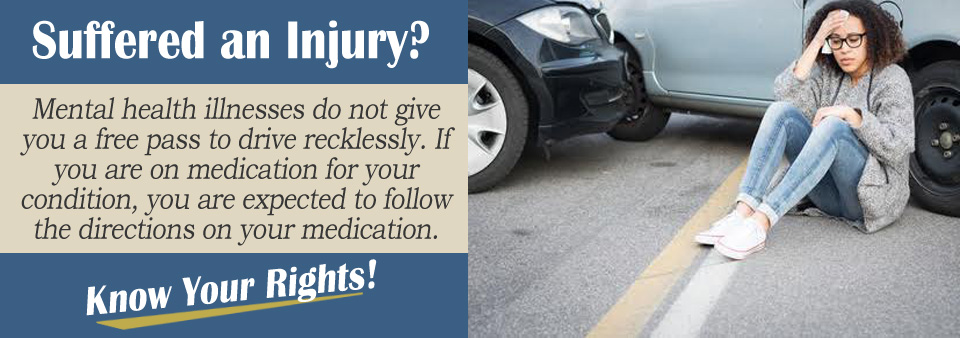If you’ve been in an accident and you are convinced that the other driver’s mental illness was a factor in the accident and you want to file a personal injury claim you can file a claim but without an attorney it will be very difficult to prove your case.
Every driver is expected to be alert and in good mental condition when they are driving. It can be almost impossible to prove that another driver’s mental health was impaired enough to have caused the accident if you don’t have help from a very skilled personal injury attorney. A personal injury attorney knows how to interpret the law and how much proof will be needed in order for a personal injury claim to be successful. Talk to an experienced personal injury attorney today if you think that the other driver’s mental state played a role in the accident.
We have asked attorney, Alaina Sullivan, about what you should do. Here is what she had to say:
Duty of Care as Reasonable Person
Any driver on the road is held to a certain duty of care to other drivers on the road. This standard duty of care is what a reasonable person would do while driving. This “reasonable” standard of care applies to all drivers, regardless of any conditions they may have, including mental health conditions.
Being on the road as a licensed driver carries a huge responsibility, and for the same reason children who are 16-years-old and older are held to a reasonable person standard, as well as drivers with any other kind of medical condition, so are individuals with mental health illnesses.
Mental health illnesses do not give you a free pass to drive recklessly. If you are on medication for your condition, you are expected to follow the directions on your medication. If it warns that it may affect your ability to drive, it is expected that you will heed that warning.
If you do not, and your failure to follow the directions of the medication leads to an accident, you will be held liable.
How Serious Is the Mental Illness?
Not all mental illnesses are the same. They differ on many levels, including the way in which they affect your day-to-day life. Many mental health illnesses are debilitating, and for this reason, many people who suffer from those that are debilitating, are unable to drive or do other “normal” daily tasks.
If you are suffering from a mental health condition that is well-controlled by medication and therapy, the fact that you have the condition should not typically affect your ability to drive or your liability in the event you cause a car accident.
It is highly unlikely you would be able to claim that your illness played any part in the car accident. However, if you are an individual suffering from a serious mental health illness that requires you to be under the care of a guardian, and you cause an accident while on the road.
The driver who was not at fault in the accident could potentially seek compensation from the driver’s guardian.

Is there Someone Responsible for the Driver?
In situations where the mental health illness is serious and requires another individual to be a legal custodian over the other person, that guardian assumes liability for the protected party’s actions, a lot like a parent would over a child.
Granted, yes, the driver does hold liability for his or her actions, but if the driver has no control over his or her assets or finances because of the mental health illness, the injured party could seek relief from the legal guardian or conservator.
PTSD, Mental Trauma, and Car Accidents
One of the potential mental health issues that could be seen on the road is Post Traumatic Stress Disorder. Serious car accidents are a highly traumatic experience. If the other driver was in a traumatic accident, it is possible that they were not ready to be back on the road. Some of the symptoms of PTSD include, flashbacks, fear, and extreme anxiety. All of which would seriously inhibit driving ability. Although it could have been a tragic accident, the other driver still has to do their due diligence before they get back on the road.
As you are going through the case see if the other driver took the right steps before getting behind the wheel. These can include:
Start as a passenger – This way they can learn how they react to the situations that they will face on the road, but will not have to focus on driving.
Testing the waters – Taking short trips in low traffic areas will help them ease back into driving. If the accident occurred in a highly congested area or at a stress inducing situation like merging on to the highway, it is possible that they were not ready and therefore liable.
It might not be comfortable to ask about the other driver’s mental state, but you should not suffer if they did not prepare adequately.
Freak Accident
Not all mental health illnesses are known at the time the accident happened.
If, for instance, a driver suddenly has an epileptic seizure while behind the wheel but has not ever been diagnosed with epilepsy, nor has had any reason to believe he or she would have this condition, insurance companies and a court would take into consideration the lack of control the driver would have in this situation.
The driver may have some level of culpability in paying the injured party for his or her injuries, but that level of fault may be reduced somewhat by the unusual and extenuating circumstances.
Contact an Attorney Today
A licensed personal injury attorney will be able to evaluate your case and determine if you have a claim against the other party’s insurance company. It is recommended you speak with a personal injury attorney in your area today to help you receive compensation for:
- Your medical bills
- Property damages
- Pain and suffering
- Other damages
